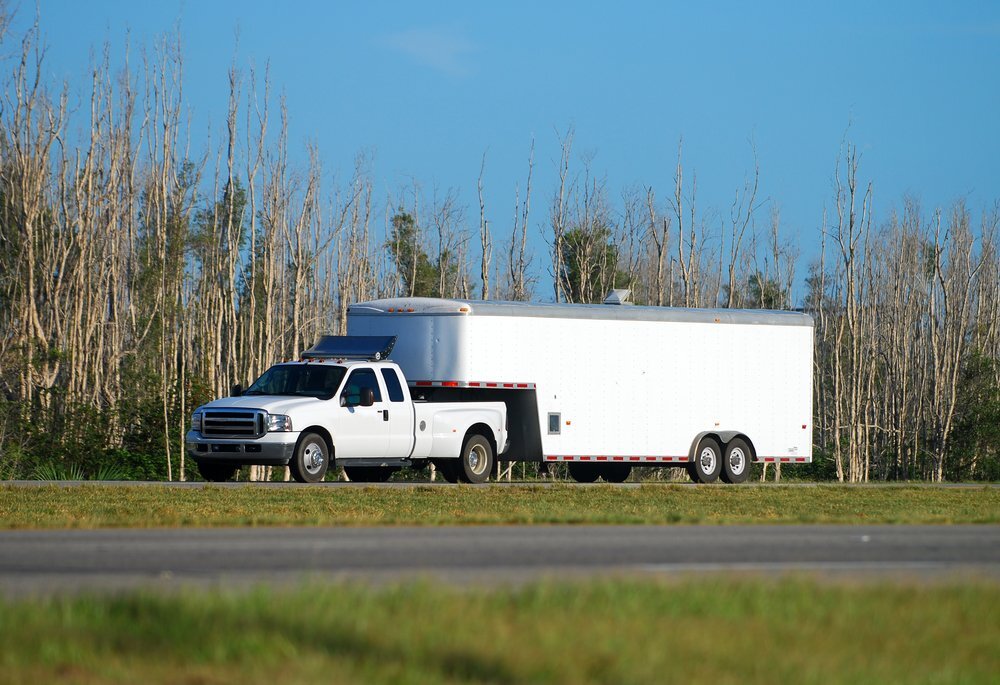The Effects of Improper Towing of an Enclosed Trailer: Causes and Consequences

Towing an enclosed trailer might seem like a straightforward task, but it’s far from it. Improper towing can have a myriad of negative consequences, not only for the trailer itself but also for your safety and the safety of others on the road. In this article, we will delve into the effects of improper towing of an enclosed trailer, exploring the causes behind issues such as overloading, flat spots on tires, unbalanced loading, and neglect. By understanding these issues and their consequences, you can ensure safer towing experiences.
Overloading: A Recipe for Disaster
One of the most common causes of improper towing issues is overloading the enclosed trailer. Overloading occurs when you exceed the trailer’s maximum weight capacity, and it can have serious consequences. The weight limit is not just a suggestion; it’s there to ensure safe operation. When you overload a trailer, several problems can arise:
- Reduced Control: Overloaded trailers are difficult to control, especially when you need to make sudden maneuvers or stop quickly. This can lead to accidents, particularly in emergency situations.
- Increased Stopping Distance: The added weight puts more strain on your vehicle’s braking system, increasing the distance required to come to a complete stop. This can result in rear-end collisions if you can’t brake in time.
- Tire Blowouts: Overloading places excessive stress on your trailer’s tires, leading to premature wear and an increased risk of blowouts. A blown tire can cause loss of control and accidents.
- Structural Damage: The frame and suspension of the trailer can suffer long-term damage from overloading. This can lead to costly repairs or even render the trailer unusable.
To avoid overloading, always check the manufacturer’s specifications for your trailer’s weight limits. Ensure you distribute the weight evenly inside the trailer and secure the load properly to prevent shifting during transit.
The most recommended method of loading and securing a load is the 60/40 rule. This rule states that 60% of your load should be in front of the axles and 40% of the weight of your load should be behind the axles. This can be done with any and everything you load no matter if it’s a vehicle or household goods.
Staying under the recommended weight capacity of the trailer is vital in preventing damage caused by overloading. Most experts even recommend that you avoid exceeding 90% of the max capacity.
If you have too much weight in the back, you have a much higher chance of “fish-tailing” and losing control of your towing vehicle and trailer. Fish-tailing happens when the back of your trailer begins to sway back and forth similar to how a fish swims with its tail. This is most commonly attributed to excessive weight in the rear of the trailer.
Flat Spots on Tires
Flat spots on trailer tires are another issue that can result from improper towing, specifically from neglecting to adjust your brake controller in the towing vehicle. When you hook up to a trailer and attach
Flat spots occur when the weight of the trailer bears down on the tires for an extended duration, causing localized compression of the rubber. This can result from leaving the trailer stationary for too long, especially during cold weather when the tires can become brittle.
Flat spots can have several negative consequences:
- Vibration and Unpleasant Ride: Flat spots can cause vibrations that transmit through the trailer, leading to an uncomfortable ride. This not only affects your comfort but also can damage the trailer’s components over time.
- Reduced Tire Lifespan: Flat spots increase tire wear, reducing their overall lifespan. This means more frequent replacements, which can be expensive.
- Safety Hazards: Uneven tire wear can affect handling and traction, increasing the risk of accidents, especially during adverse road conditions.
To prevent flat spots, make sure to periodically move the trailer, even if it’s not in use. Additionally, maintain proper tire pressure and inspect the tires regularly for signs of wear or damage.
Unbalanced Loading: A Recipe for Instability
Another common cause of issues during trailer towing is unbalanced loading. Unbalanced loading occurs when you place too much weight on one side of the trailer or fail to distribute the weight evenly between the trailer’s axles. This can lead to several problems:
- Instability: An unbalanced trailer is prone to swaying and fishtailing, making it difficult to control. This instability can result in accidents, especially when driving at high speeds or in adverse weather conditions.
- Uneven Tire Wear: Uneven loading can lead to uneven tire wear on the trailer, causing premature tire replacement and reducing your overall safety on the road.
- Structural Strain: Unbalanced loading can place excessive strain on the trailer’s frame and suspension, potentially leading to long-term damage.
To avoid unbalanced loading, make use of trailer scales to ensure an even distribution of weight. Properly secure your cargo to prevent shifting during transit, and regularly inspect and adjust the load as needed during long trips.
Neglecting proper maintenance
Neglect is perhaps the most insidious cause of improper towing issues. It can encompass various aspects, including failure to perform routine maintenance, skipping safety checks, and ignoring the signs of wear and tear on the trailer. Neglect can lead to a cascade of problems, such as those discussed above, and more.
To prevent the negative effects of neglect:
- Regular Maintenance: Perform regular maintenance on your trailer, including checking tire pressure, inspecting brakes and lights, and greasing moving parts. This will keep your trailer in top condition and reduce the risk of unexpected issues.
- Safety Checks: Before hitting the road, conduct thorough safety checks, including inspecting the hitch, ensuring proper trailer lighting, and securing the cargo properly. Neglecting these checks can lead to accidents.
- Timely Repairs: Address any signs of wear and tear promptly. Ignoring minor issues can lead to major, costly problems down the road.
Conclusion
Properly towing an enclosed trailer requires attention to detail and a commitment to safety. Understanding the causes and consequences of improper towing, such as overloading, flat spots on tires, unbalanced loading, and neglect, is essential to ensure a safe and trouble-free towing experience. By following recommended guidelines, performing regular maintenance, and conducting safety checks, you can avoid the negative effects of improper towing and enjoy your trailer adventures with peace of mind. Remember, safety should always be the top priority when towing a trailer, for your sake and for the safety of others on the road.






